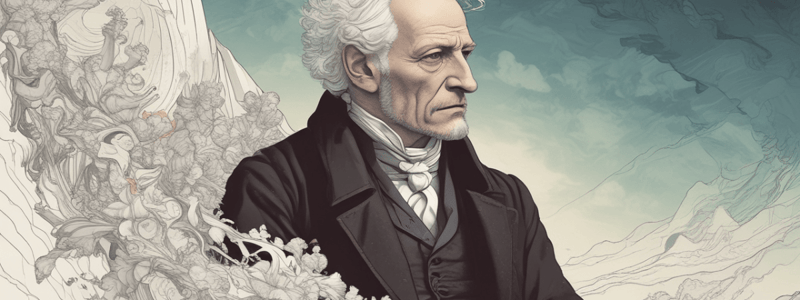Podcast
Questions and Answers
What is the primary human motive, according to Arthur Schopenhauer?
What is the primary human motive, according to Arthur Schopenhauer?
- The will to survive (correct)
- The will to be happy
- The will to be free
- The will to help others
What is the result of need satisfaction, according to Schopenhauer?
What is the result of need satisfaction, according to Schopenhauer?
- A state of complete fulfillment
- A temporary postponement of death (correct)
- A state of permanent happiness
- A state of freedom from desire
What is the noumenal world, according to Schopenhauer?
What is the noumenal world, according to Schopenhauer?
- The world of the intellect
- The world of moral principles
- The world of blind, aimless will (correct)
- The world of conscious awareness
Why do people cling to life, according to Schopenhauer?
Why do people cling to life, according to Schopenhauer?
What is the relationship between intelligence and suffering, according to Schopenhauer?
What is the relationship between intelligence and suffering, according to Schopenhauer?
What is one way to attain relief from the irrational forces within us, according to Schopenhauer?
What is one way to attain relief from the irrational forces within us, according to Schopenhauer?
What is the state characterized by freedom from irrational strivings, according to Schopenhauer?
What is the state characterized by freedom from irrational strivings, according to Schopenhauer?
What is the essence of human existence, according to Schopenhauer?
What is the essence of human existence, according to Schopenhauer?
Flashcards are hidden until you start studying
Study Notes
Schopenhauer's Philosophy
- The will to survive is the most powerful human motive, driving an unending cycle of needs and need satisfaction.
- Need satisfaction merely postpones death, and humans can only minimize the irrational forces operating within them.
- Schopenhauer equated the noumenal world with the "will", a blind, aimless force that cannot be known.
- In humans, this force manifests itself in the will to survive, causing an unending cycle of needs and need satisfaction.
Human Behavior
- The powerful drive toward self-preservation, not the intellect and not morality, accounts for most human behavior.
- Suffering varies with awareness, and intelligent beings suffer the most.
- Highly intelligent people seek solitude, while common people are gregarious.
- People do not cling to life because it is pleasant, but because they fear death.
Overcoming Irrational Forces
- Humans can attempt to rise above the irrational forces by making great effort.
- Approaching nirvana, a state characterized by freedom from irrational strivings, is possible.
- Immersing oneself in activities that are not need-related (e.g., poetry, theatre, art, music, Platonic philosophy, or unselfish love) can provide relief from irrational forces.
- Asceticism can also counteract these forces, especially the sex drive.
Human Existence
- The essence of human existence is the relationship between the noumenal (the powerful, aimless will) and the phenomenal (consciousness).
- This relationship causes an unending cycle of need and need satisfaction.
- The proper adjustment to this tragic condition is to struggle to rise above it or minimize it.
- Suicide evades this noble effort and is, therefore, a mistake.
Observations on Human Nature
- Humans have both positive (intellectual, rational) and negative (animalistic) impulses.
- Consciousness is the mere surface of our mind, and we do not know the interior (the unconscious mind), but only the crust.
Studying That Suits You
Use AI to generate personalized quizzes and flashcards to suit your learning preferences.




